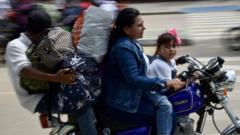In a troubling update, Colombia's human rights office reports that the skirmishes have escalated into deadly confrontations, breaking a tenuous truce that had been in place between the ELN and Farc, a former insurgent group that had previously signed a peace treaty with the government in 2016. The recent spike in violence has led to fears of increased risks for community leaders and local populations, especially women and vulnerable groups who are reportedly facing increased abductions and killings.
The Ombudsman's Office emphasizes that humanitarian conditions are deteriorating, with food shortages becoming apparent and thousands displaced by the conflict. This highlights the grave implications for civilians, particularly elderly people and children. Quotes from local advocacy groups express deep concern over the emotional toll and trauma inflicted on communities as violence disrupts lives and erodes safety.
President Gustavo Petro has condemned the ELN, labeling their actions as "war crimes" and suggesting they show no intent for peaceful resolution. In contrast, the ELN has placed blame on Farc for igniting the recent conflicts. In response to the unfolding chaos, Colombia's military has announced the deployment of additional troops to the region, hoping to stabilize the area and restore peace.
The tragic events in Catatumbo serve as a poignant reminder of the enduring struggle against drug trafficking and the critical need for effective governance and reconciliation in Colombia.
The Ombudsman's Office emphasizes that humanitarian conditions are deteriorating, with food shortages becoming apparent and thousands displaced by the conflict. This highlights the grave implications for civilians, particularly elderly people and children. Quotes from local advocacy groups express deep concern over the emotional toll and trauma inflicted on communities as violence disrupts lives and erodes safety.
President Gustavo Petro has condemned the ELN, labeling their actions as "war crimes" and suggesting they show no intent for peaceful resolution. In contrast, the ELN has placed blame on Farc for igniting the recent conflicts. In response to the unfolding chaos, Colombia's military has announced the deployment of additional troops to the region, hoping to stabilize the area and restore peace.
The tragic events in Catatumbo serve as a poignant reminder of the enduring struggle against drug trafficking and the critical need for effective governance and reconciliation in Colombia.

















